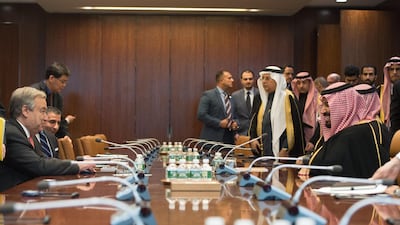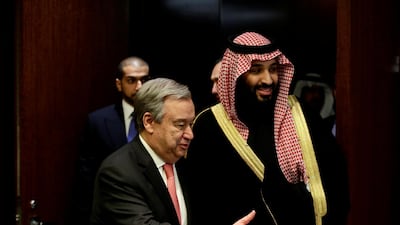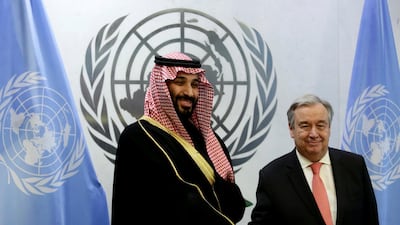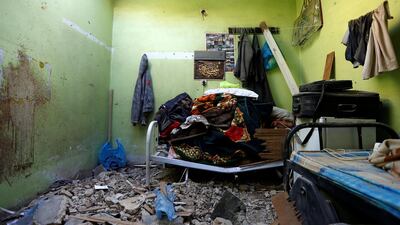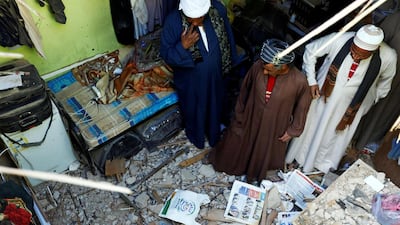Saudi Arabia’s foreign minister accused Iran and its Lebanese proxy, Hezbollah, of being behind Sunday’s ballistic missile attacks on the kingdom, saying that the country has the right to respond at the “appropriate time and place”.
“The position of the Kingdom of Saudi Arabia is very clear on the Iranian ballistic missiles that were launched from Houthi territory in Yemen by Iranian agents and agents of Hezbollah towards the kingdom, and it is a stark violation of international law,” said Adel Al Jubeir at the UN headquarters in New York following a meeting between Crown Prince Mohammed bin Salman and UN chief Antonio Guterres.
“The kingdom has the right to respond to this hostile Iranian act in the appropriate way at the right time and place.”
Saudi forces said they intercepted seven missiles late Sunday, including one over the capital Riyadh. One Egyptian man died when burning shrapnel struck his room in the capital.
_______________
Read more:
Analysis: Houthis' military posturing could derail political talks
_______________
Mr Al Jubeir reiterated that the Saudi-led coalition fighting in Yemen on behalf of the internationally recognised government has presented evidence that ballistic missiles found in the country were smuggled from Iran.
“We have objected to it, and we have presented it to the world and to our allies to reaffirm they are Iranian missiles, and they are, no doubt,” he said in his first comments since the attack.
The Houthi rebels have fired dozens of missiles into Saudi Arabia since last year, all of which Saudi forces have intercepted.
A major attack targeted Riyadh international airport on November 4, and another strike on December 19 targeted Riyadh's Yamamah palace — the official residence of the king.
Mr Al Jubeir said that Tehran was in clear violation of international law and of UN resolution 2216 – which imposes an arms embargo on the rebels. He added, however, the UN efforts to address arms smuggling into Yemen are improving.
Mr Al Jubeir also said that Saudi Arabia and the UAE — which is also part of the Arab coalition fighting in Yemen — will present a $930 million (Dh3.4bn) cheque to the UN for humanitarian aid in Yemen during Tuesday’s UN conference.
The kingdom will provide an additional $70m that would go towards the war-torn country’s infrastructure, he added.
Meanwhile, Mr Guterres expressed in a statement following a two-hour meeting with Saudi’s Mohammed bin Salman “his deep gratitude to the crown prince for delivering today on the generous pledge".
The two men discussed the war in Yemen and the need for all parties to adhere to international humanitarian law, said the UN statement, adding they also addressed “the critical need for humanitarian access across the country and for all of Yemen’s ports to remain open to both humanitarian and commercial movement”.
Mr Guterres and Crown Prince Mohammed also talked about the need for a “political settlement through inclusive intra-Yemeni dialogue”.
In Washington, US Secretary of Defence James Mattis said on Tuesday that "the Iranian support to the Houthis that gives them this capability is clearly being countered".
He credited "in part the American systems that they [Saudi Arabia] bought and, more importantly right now, to the advisers we brought in to assist them in defence of the kingdom.”
The Yemen war was triggered when the Houthis seized the capital, Sanaa, in September 2014 and later advanced south, taking large swathes of the country.
After entering the war at the request of President Abdrabu Mansur Hadi on March 26, 2015, the Saudi-led coalition has helped pro-government forces to retake much of the territory captured by the rebels. However, Sanaa remains under rebel control.
The UN says living conditions in the war-scarred country have reached catastrophic levels and that 8.4 million people face imminent famine.



